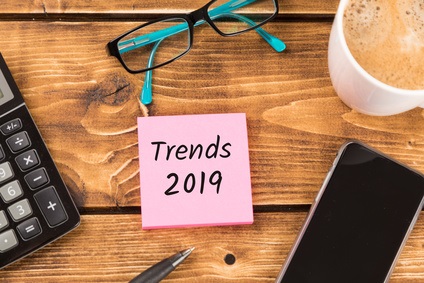My Favorite Workplace Trends for 2019
During the last week of every year, I scout business articles and professional journals for next year’s workplace trends (so you don’t have to). Here are the three I found most interesting (read outlandish) for 2019:
The Augmented Workplace
Augmented reality became popular in 2016 with the success of the cell phone Pokémon game. The AR application for the workplace doesn’t use a phone but instead uses “special glasses to project a digital overlay onto the wearer’s field of vision”. It will be most helpful in jobs involving complicated, multistep, manual tasks. Think GE Aviation engineers assembling jet engines, auto mechanics at Porsche making repairs, or surgeons who can “visualize data from ultrasound scanners, allowing them to peer through skin at underlying tissue–all but giving them X-ray vision.”
Implication: AR will be used to transform onboarding and training. It will enable junior employees to receive visual guidance from remote experts.
Nanodegrees
No. Not tiny measurements for temperature. Think small, education degrees on a focused topic. Institutions such as Udacity, Coursera, edX that offer “hyper-specific learning programs providing certifications for tech-based skills, are increasingly important alternatives to traditional four-year degrees.” The cost can be even less than community colleges.
Implication: Future job applicants may have a variety of related nanodegrees (such as artificial intelligence, data science and autonomous systems) rather than one diploma from a single institution–and the most-qualified students may take different paths from high school to the workforce.
Electrifying Your Brain
Granted, you may not see this at the office tomorrow, but, I bet you it’ll come.
Think of it as another type of coffee machine, another stimulant.
Coffee breaks have a basis in neuroscience: the brain can’t maintain focus on a boring task too long, usually after 20 min performance decreases. Caffeine extends that window. But zapping the brain with mild current extends that window much more. In tests at US Air Force’s applied neuroscience branch, subjects maintained concentration for up to six hours–without a performance drop.
Implication: Brain-zapping headsets are already available for home use (to help with sleep, creativity, depression) they may make their way to the workplace by being offered as a wellness benefit that employees may opt-in voluntarily, like meditation. And before you know it, they will be available by the coffee machine.
Go dazzle your friends with new trivia and have a great and Happy 2019!
©Copyright Eva Del Rio
Eva Del Rio is creator of HR Box™ – tools for small businesses and startups. Send questions to Eva@evadelrio.com



